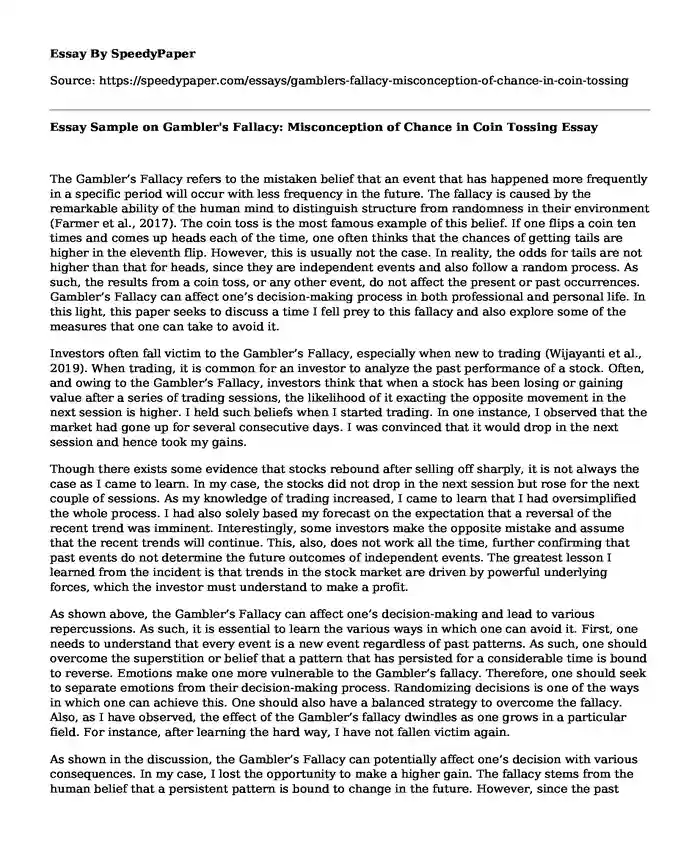
| Type of paper: | Essay |
| Categories: | Psychology Behavior |
| Pages: | 3 |
| Wordcount: | 778 words |
The Gambler’s Fallacy refers to the mistaken belief that an event that has happened more frequently in a specific period will occur with less frequency in the future. The fallacy is caused by the remarkable ability of the human mind to distinguish structure from randomness in their environment (Farmer et al., 2017). The coin toss is the most famous example of this belief. If one flips a coin ten times and comes up heads each of the time, one often thinks that the chances of getting tails are higher in the eleventh flip. However, this is usually not the case. In reality, the odds for tails are not higher than that for heads, since they are independent events and also follow a random process. As such, the results from a coin toss, or any other event, do not affect the present or past occurrences. Gambler’s Fallacy can affect one’s decision-making process in both professional and personal life. In this light, this paper seeks to discuss a time I fell prey to this fallacy and also explore some of the measures that one can take to avoid it.
Investors often fall victim to the Gambler’s Fallacy, especially when new to trading (Wijayanti et al., 2019). When trading, it is common for an investor to analyze the past performance of a stock. Often, and owing to the Gambler’s Fallacy, investors think that when a stock has been losing or gaining value after a series of trading sessions, the likelihood of it exacting the opposite movement in the next session is higher. I held such beliefs when I started trading. In one instance, I observed that the market had gone up for several consecutive days. I was convinced that it would drop in the next session and hence took my gains.
Though there exists some evidence that stocks rebound after selling off sharply, it is not always the case as I came to learn. In my case, the stocks did not drop in the next session but rose for the next couple of sessions. As my knowledge of trading increased, I came to learn that I had oversimplified the whole process. I had also solely based my forecast on the expectation that a reversal of the recent trend was imminent. Interestingly, some investors make the opposite mistake and assume that the recent trends will continue. This, also, does not work all the time, further confirming that past events do not determine the future outcomes of independent events. The greatest lesson I learned from the incident is that trends in the stock market are driven by powerful underlying forces, which the investor must understand to make a profit.
As shown above, the Gambler’s Fallacy can affect one’s decision-making and lead to various repercussions. As such, it is essential to learn the various ways in which one can avoid it. First, one needs to understand that every event is a new event regardless of past patterns. As such, one should overcome the superstition or belief that a pattern that has persisted for a considerable time is bound to reverse. Emotions make one more vulnerable to the Gambler’s fallacy. Therefore, one should seek to separate emotions from their decision-making process. Randomizing decisions is one of the ways in which one can achieve this. One should also have a balanced strategy to overcome the fallacy. Also, as I have observed, the effect of the Gambler’s fallacy dwindles as one grows in a particular field. For instance, after learning the hard way, I have not fallen victim again.
As shown in the discussion, the Gambler’s Fallacy can potentially affect one’s decision with various consequences. In my case, I lost the opportunity to make a higher gain. The fallacy stems from the human belief that a persistent pattern is bound to change in the future. However, since the past occurrences do not affect the future outcomes of independent events, the belief is unfounded. To avoid falling victim to the fallacy, one should understand that in some instances, events are independent. One should also seek to overcome the effect of their emotions when making decisions.
References
Farmer, G. D., Warren, P. A., & Hahn, U. (2017). Who “believes” in the Gambler’s Fallacy and why? Journal of Experimental Psychology: General, 146(1), 63. Retrieved from https://psycnet.apa.org/record/2016-62338-004
Wijayanti, D., Suganda`, T. R., & Thewelis, F. S. (2019). Gambler's Fallacy as Behavioural Bias Of Young Investor. Journal of Business and Behavioural Entrepreneurship, 3(2), 72-80. Retrieved from http://journal.unj.ac.id/unj/index.php/jobbe/article/view/12897
Cite this page
Essay Sample on Gambler's Fallacy: Misconception of Chance in Coin Tossing. (2023, Nov 22). Retrieved from https://speedypaper.com/essays/gamblers-fallacy-misconception-of-chance-in-coin-tossing
Request Removal
If you are the original author of this essay and no longer wish to have it published on the SpeedyPaper website, please click below to request its removal:
- Fishing and Finding a Wife - Comparison Essay Sample
- Solution-Focused Therapy Essay Sample
- Free Essay: A Discussion on the Scores of Stress Scale
- Paper Example - Sociological Imagination to Personal Trouble
- All's Well That Ends Well by Shakespeare on Character's Realism. Free Essay
- Free Paper on Truthful Communication: A Path to Authentic Relationships and Spiritual Fulfillment
- Emotional and Physical Stress for Nurses - Essay Sample
Popular categories




